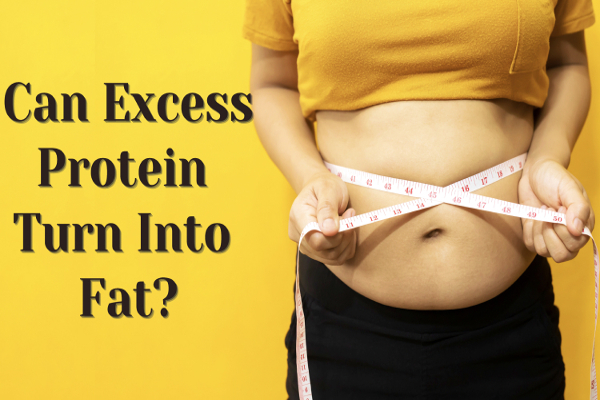
There’s a myth floating around that if you consume excessive protein, your body will turn it into fat.
Assistant professor and sports dietitian at Ohio State University Jackie Buell, Ph.D., C.S.S.D., notes that “protein is insulinogenic,” meaning it can activate an insulin response, which puts the body in storage mode.
To clarify, your body can turn the extra calories from protein into fat. Nonetheless, there is no definitive research on the maximum daily intake of protein before the body begins to convert that protein to fat. As a matter of fact, we do know that the threshold for protein to fat transformation is rather high, as several studies have investigated what occurs when people eat a lot of protein, and none of those studies revealed changes in body fat composition.
Does Consuming Excess Protein Lead to Fat Gain?
Protein is an essential nutrient that must be consumed daily by all living beings. Protein is one of the three basic “macronutrients” in the human diet, the others being carbs and fat. Everyone who took chemistry or biology in high school knows that proteins are essential for the body’s biochemical processes since they are one of the building blocks of cells.

Its role in helping build muscle and repair damaged tissue is well-known among athletes and gym-goers. There is a wide variety of food types that provide protein for humans. Protein can be found in a wide variety of foods, including meat, dairy products, beans, and nuts. Protein is a vital part of our diets, and we often supplement it with smoothies and other similar products.
But can eating too much protein lead to weight gain? In a nutshell, yes! Eating too much of anything can lead to weight gain. The more involved answer is as follows. In most cases, a person’s complete diet, including the quantity of fats and carbohydrates taken, will explain why they gain weight when eating more protein.
There is a common misconception in the nutrition world that consuming an excessive amount of protein would only lead to rapid muscle growth. The truth is that the human body can turn almost any macronutrient into fat. One important lesson from this study is that eating too much protein leads to extra fat storage, albeit the specific pathways involved vary depending on the macronutrient (lipid synthesis).
How Does Protein Become Body Fat?
Let’s say you take in more protein than your body needs to promote muscle growth and repair. In that situation, the nitrogen from the surplus protein is removed, and the protein is quickly incorporated into the glycogen synthase cycle. After this point, the body can’t tell if the ensuing glycogen was derived from glucose and amino acids. A surplus of sugar makes fat storage a simple process.
When Does Protein Become Dangerous?
Protein is essential for proper nutrition and the preservation of muscle mass and strength as we age. But what exactly is the ideal daily intake of protein? Well, that is conditional on things like age, weight, gender, and level of physical activity.
If we use the weight-based advice from Harvard Medical School, the number is 0.8 grams per kilogram of body weight.
If your weight is 140 pounds, your daily protein intake should be 51 grams. Your protein demands may be significantly higher if you are really active or trying to gain muscle mass.
Unless you’re an expert athlete, eating more than two grams of protein per kilogram of body weight is considered “too much” by the Harvard Medical School. If so, a person weighing 140 pounds should not exceed 125 grams each day.




